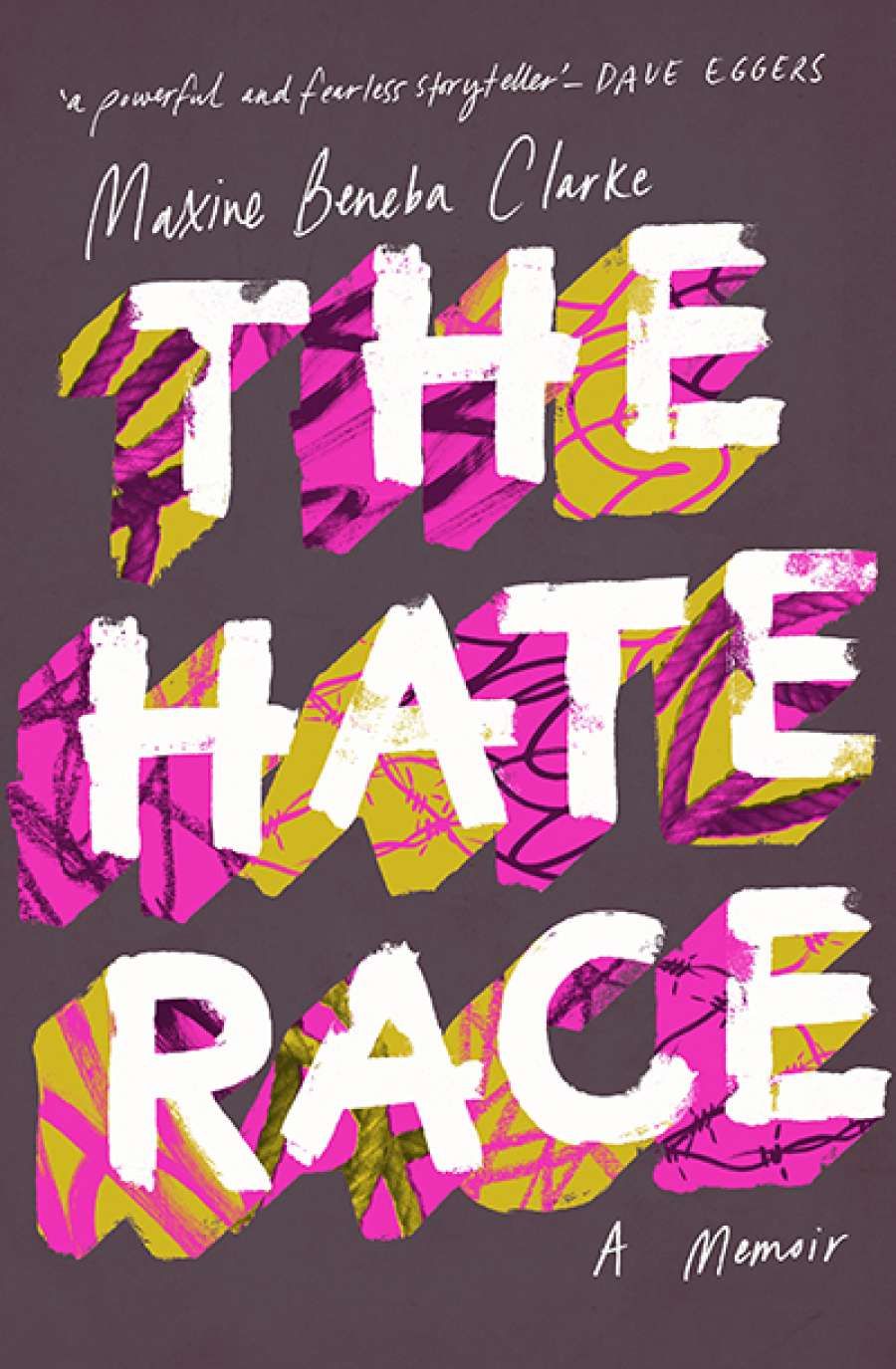
- Free Article: No
- Contents Category: Memoir
- Custom Article Title: Catherine Noske reviews 'The Hate Race: A memoir' and 'Carrying the World' by Maxine Beneba Clarke
- Review Article: Yes
- Online Only: No
- Custom Highlight Text:
Across two new titles, Maxine Beneba Clarke offers an unflinching portrayal of the impact of racism, and transcends form in turning a lens on Australian society ...
- Book 1 Title: The Hate Race
- Book 1 Subtitle: A memoir
- Book 1 Biblio: Hachette, $32.99 pb, 271 pp, 9780733632280
- Book 2 Title: Carrying the World
- Book 2 Biblio: Hachette, $26.99 pb, 183 pp, 9780733636400
This voice is balanced with narratorial interjections. Beneba Clarke repeatedly interposes on the child perspective with a series of self-reflexive considerations of the writing as an act. These interjections become almost a mantra, shifting slightly in wording but turning on the same two ideas: racism as a force and writing as a response, singing to be read, 'or else what's a story for'. In this, the adult perspective directly addresses us as readers, forcing us to bear witness. The structure interrupts participation with the narrative and reminds us that we as readers represent the society perpetrating the violence portrayed. Ultimately, this separation between the two versions of the self presented, one victim and one survivor, shapes the emotional development of the work.
This adult perspective is taken up in Carrying the World, and here, through the skilful use of both parataxis and imagery, all the force of that survivor-status is felt. It is also problematised, as we are left in no doubt that racial violence is continuing. We are inclined to use the phrase 'casual racism' when recognising social inequality in Australia, and in doing so we downplay the violence that any act of racism represents. Beneba Clarke refuses us this luxury and throughout the collection lays bare the effect this 'casual' racism has on victims. There is a more overt anger to be felt in the poetry, and seemingly more freedom of expression. The writing opens into a more intimate experience.
 Carrying the World by Maxine Beneba Clarke (Hachette)Relatively early in the piece, for example, the suite 'Demerara Sugar' moves over twelve parts to recount Beneba Clarke's work in tracing her family history – work that was supported by the Hazel Rowley Fellowship for Biography. The poem reprises some of the family relationships and memories included in her memoir, taking them forward into more complex ground. The motif of sugar opens a generational interplay which reaches back into a history of slavery, from the 'sweet splintered ground / uneven with granule spill' of the sugar warehouse of West India Quay to fallen apples returning home, 'black and heavy / black and heavy like // molasses'. Sugar and its trauma come to be internalised, embodied, in family illness and high blood sugar:
Carrying the World by Maxine Beneba Clarke (Hachette)Relatively early in the piece, for example, the suite 'Demerara Sugar' moves over twelve parts to recount Beneba Clarke's work in tracing her family history – work that was supported by the Hazel Rowley Fellowship for Biography. The poem reprises some of the family relationships and memories included in her memoir, taking them forward into more complex ground. The motif of sugar opens a generational interplay which reaches back into a history of slavery, from the 'sweet splintered ground / uneven with granule spill' of the sugar warehouse of West India Quay to fallen apples returning home, 'black and heavy / black and heavy like // molasses'. Sugar and its trauma come to be internalised, embodied, in family illness and high blood sugar:
demerara sugar
bet you anything
it took uncle buddy's ma
four hundred years on
demerara is still trying
to kill us all
The only uncomfortable moment in reading the collected poetic work (Carrying the World is arranged in alphabetic order, very much giving the sense of a collected oeuvre) was the manner in which Beneba Clarke expands her experience out towards other cultures. The poem 'Marngrook', for instance, connects to indigenous Australia. But at the same time, Beneba Clarke is reaching towards portraying racism as a phenomenon. The closing emphasis is on a unilateral engagement with the problem: 'it is our / responsibility / to point'. In producing these two new titles within the same year, across very different forms, Beneba Clarke invites the reader to participate in an exploration of the manner in which writing can function as an art-form to face the ongoing social crisis of racism. Both works constantly question how writing works and its capacity to carry a voice. In her poetry, this is through the use of accent. Her memoir, alternately, insists on voice through the refrain of singing, repeated again and again: 'There are a myriad ways of singing it, but this is the melody I hum. That West Indian way, of crooning a tale. Or else what's the music for?' The shift implied, from how it is sung to why, is crucial.
 Maxine Beneba Clarke (photograph by Nicholas Walton-Healey)
Maxine Beneba Clarke (photograph by Nicholas Walton-Healey)
Carrying the World seems to be a personal endeavour. Language appears to function as a site of reclamation, opening the poet's experiences and offering the possibility of both healing and resistance. But in her memoir, Beneba Clarke turns the lens back onto our society. It inverts the normal act of witnessing to focus directly on the perpetrators rather than the victims. This is signalled in the title, The Hate Race, reversing the normative phrasing of racial hatred to concentrate instead on the perpetrating race. The deliberate nature of this manoeuvre characterises the precision with which Beneba Clarke takes up writing as a weapon.
The Hate Race and Carrying the World demonstrate Maxine Beneba Clarke's capacity to engage with Australian society while also opening an intimate relationship with her reader. They are both compelling and emotional works.


Comments powered by CComment